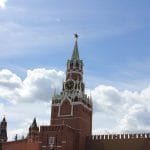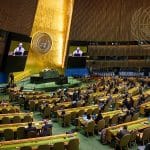While the Name Dispute between Greece and the newly-renamed Republic of North Macedonia has fallen out of the headlines, several notable developments occurred in the past week, generally off the radar except for the political leadership in the countries involved. Russia extended diplomatic recognition to North Macedonia, Greece implemented new customs procedures regarding its northern neighbour, while an important judicial decision was issued in Skopje. Language and nationality issues and public references to them remain a very tender subject for both countries. A senior North Macedonian official revealed that NATO, not the EU, proved to be the key factor in North Macedonia’s rush to enter Euro-Atlantic institutions.
Russia recognises North Macedonia
Despite earlier reservations about the legality of the constitutional amendments approved in Skopje in connection with the June 2018 Prespes Agreement, the Russian Federation recognised the Republic of North Macedonia as the country’s new official name on 18 March, using a simple diplomatic note. This step puts Russia ahead of the United States in recognizing the country’s new official name, even though Washington is considered by almost all observers as the primary driver just behind the UN for the deal between Greece and its northern neighbour.
Travel and customs procedures are adapting
Greece’s Independent Authority for Public Revenue (AADE) on 18 March issued an urgent circular towards all state-affiliated entities in the country, detailing customs and financial procedures involving trade and transactions with the newly-renamed Republic of North Macedonia.
The document states that for acceptance by any organ of the Greek state, the name Republic of North Macedonia, or North Macedonia in its short form, must be used in all instances and vis-a-vis all third parties. Brand names, logos and product names are not covered by these instructions as a separate new dispute resolution panel has been designated by the Prespes Agreement to resolve such disputes.
Until new passports are issued, North Macedonian authorities will be required to stamp travel documents with a message making it clear that the documents represent the Republic of North Macedonia. The country codes on license plates for vehicles registered in North Macedonia will be “NM” or “NMK,” replacing the previous “MK.”
Under the Prespes Agreement, vehicle owners will have a five-year grace period in which to replace their plates, while authorities in Skopje have assumed the commitment to procure stickers reading “NMK” for use on older plates, some of which have already been spotted in Greece.
Justice North Macedonian style, framed by the Prespes Agreement
Late on March 15, a North Macedonian court sentenced 16 people, including a former interior minister, to long prison terms for actions in the invasion of the country’s parliament on 27 April 2017. The harshest sentence went to former Interior Minister Mitko Cavkov, who will be jailed for 18 years on charges of “terrorist endangerment of the constitutional order and security.”
The court sentenced 15 other people to terms of seven to 15 years for similar offences while well-known opera singer Igor Durlovski was acquitted. Some of those convicted were accused of not doing what they should have done to prevent the invasion of the parliament building.
Most of the convicted are former officials or at least supporters of the main opposition VMRO-DPMNE party, which called the 15 March court rulings unfair and politically-biased. Many VMRO-DPMNE politicians sought to prevent the then-opposition Social Democrats from forming a government that included parties representing the country’s ethnic Albanian minority. Dozens of journalists and lawmakers were injured when about 100 demonstrators, some masked, invaded the building. Those injured included Prime Minister Zoran Zaev, then-opposition leader.
Another 15 people had initially been charged but were pardoned earlier by an amnesty law passed by Zaev’s government in connection with the Prespes Agreement. Five of those pardoned were lawmakers from the VRMO-DPMNE who were seen as crucial to passage of the Prespes Agreement’s required constitutional amendments.
Curiously, none of the Western governments, NATO, or the EU have chosen to comment on the judicial machinations in Skopje, and human rights groups as well have paid scant attention to the procedural irregularities, sometimes highlighted loudly by Russian representatives, but generally ignored.
Zaev again provokes the Greeks unnecessarily on his country’s language
Ignoring his unimpressive track record with the Greek public concerning provocative remarks surrounding the names/terms used for his country’s citizens, Zaev said again on 19 March that the name of the language was accepted in the Prespes Agreement, which was ratified this year by the two parliaments. With the approach of the Greek Independence Day celebrations on 25 March, one would have expected Zaev to have been briefed on the need to speak and act with additional sensitivity. Instead, he told the Macedonian Information Agency (MIA), that the “Macedonian language” is also spoken by the country’s diaspora and that Greece should comment if that is the case within its own territory.
Zaev stated that the Prespes Agreement clarifies that the “Macedonian language” belongs to the Slavic group of languages and has nothing to do with Greek heritage. He is correct in asserting that there is a section in the agreement which attempts to address this but is seen by many as unsatisfactory. On 16 March, prominent Greek linguist and former Education Minister Georgios Babiniotis is reported to have described Greece’s recognition of a Macedonian language as a “grave mistake.”
NATO’s open door, not the EU, was the decisive factor
Perhaps the most interesting revelation of the week came from North Macedonia’s Defence Minister, Radmila Sekerinska, who said at a German Marshall Fund event in Brussels on 18 March that the Prespes Agreement survived the intense political gauntlet in Skopje only because of the prospect of joining NATO, not the EU.
Sekerinska noted her country simply could not count on speedy EU accession since Brussels had not been delivering on its promises. She stated the country has been an EU candidate since 2005.
“If it hadn’t been for the NATO opportunity, the Prespes Agreement could have been dead, because of this lack of delivery from the EU side,” Sekerinska said.
A group of EU countries such as Denmark, France and the Netherlands have been reluctant to accelerate EU enlargement negotiations. In view of this, the Commission has postponed the annual Enlargement Package reports until after the May European elections.
“The big weakness during the negotiations last year was that we could not foresee how the EU would respond to the Prespes Agreement and whether they would be strong enough to make a decision [regarding Skopje’s EU path],” Sekerinska said.
“This is why, when we analyse the difficult choices in our region, in Georgia, in Ukraine, the hope has to be strong and it cannot be ambiguous […] that is why the open-door policy is a must, one that everyone can count on,” she added.
For its part, Greece’s SYRIZA government is pushing its EU partners to open the EU negotiations for North Macedonia in June. Greek Foreign Minister Giorgos Katrougalos said on 18 March that Skopje had already delivered, along with the Prespes Agreement, “important, serious reforms related to the new legislation about organised crime, civil service reform and they will continue to deliver.” Katrougalos asserted “We, the European Union, should deliver back.”
Name Dispute: Important issues progressing while public attention fades
North Macedonia praises NATO’s open door, worried about EU indecision
- Advertisement -
- Advertisement -







